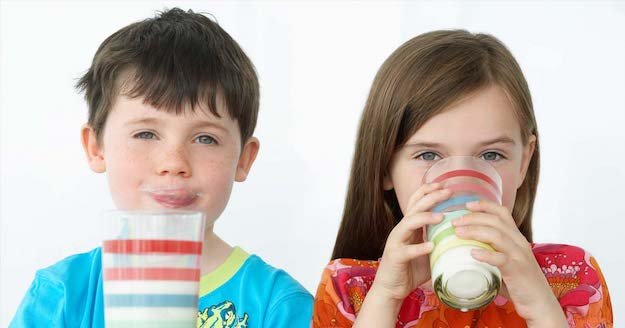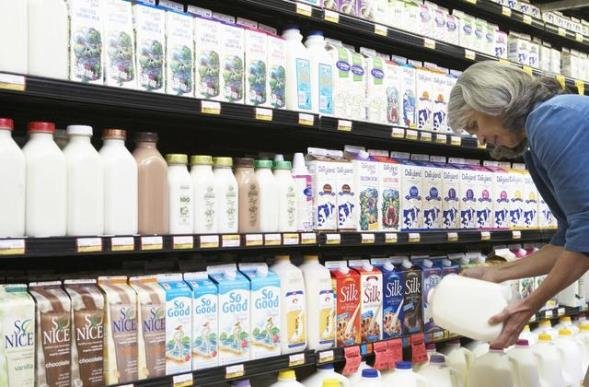A Study Shows That Kids Who Drink Non-Cow Milk Are Shorter

Ordinarily, when the image of a child sipping and drinking a warm glass of milk comes into view, they usually look adorable, especially with the white milk residue all over their mouth.
Such a sight shouldn’t generate much of a fuss, normally. But when the very glass of milk can be fingered as the reason why a child could possibly be shorter compared to other kids, then perhaps there is a cause for concern.

A research has revealed that parents who prefer to feed their children with non-dairy or non-cow milk are practically stunting the growth and height of their children.
There are so many non-dairy milks promising so many nutrients upon consumption, but such drinks like almond, soy, coconut or rice milk have been discovered to have 'shortening' effects on the heights of kids
The Research
Based on a research study published in The American Journal Of Clinical Nutrition, it was revealed that children who consume daily cups of non-dairy products tend to be about 0.4 centimetres (0.15 inches) shorter that children who drink the dairy/cow milk.

Also the study showed that the more non-dairy milk a child ingests, the greater the reduction or deficiency in height. This means that children who drink three cups of non-dairy milk daily tend to be about 1.5 centimetres (0.6inches) shorter than children who are cow-milk favourites.
The lead researcher for the study, Dr. Jonathan Maguire of St. Michael’s Hospital in Toronto, Canada pointed out to CNN that it is; “Not a tiny difference” for young children.
Dr. Maguire also stated that he found it particularly remarkable that increase in the consumption of non-dairy milk correlated to increase in the disparity in height.
Highlighting the point, Maguire said;
“It’s not like if you’re not consuming cow’s milk, you’re a little shorter. It’s more like if you are consuming non-cow’s milk, with each cup that a child consumes, that child on average appears to be a little bit smaller, a little shorter. That’s a bit surprising.”
The Investigation
Dr. Jonathan Maguire and his research company carried out a tracking survey of the growth of more than 5,000 Canadian children and discovered the height differences.
They studied an even gender of the children who were split into the ages of two and six.
- About five percent drank only non-dairy milk.
- 84 percent drank cow’s milk exclusively.
Out of the remaining children;
- About eight percent drank both, while;
- About three percent drank neither.

Concerns and Questions
After the research, as expected, the ‘non-dairy’ drinkers ended up shorter in height. However, the study did generate a couple of concerns and questions.
For instance, the issue of whether the research team should have considered other factors other than just the milk consumption of their subjects was brought up. And sure enough, some researchers said yes, that other factors should have been considered as well, asides just their milk consumption.
Also the matter of whether the non-dairy consumers eventually catch up in height to the dairy drinkers with time was raised. But Dr. Jonathan Maguire wasn’t sure yet.
In Conclusion
The research might be worrisome to lots of parents who for one reason or the other might not be comfortable with this latest discovery; especially if they've been feeding their kids with the non-dairy products for years.
Also the exact reason why non-dairy alternatives cause children to be shorter than their dairy-drinking counterparts is still unclear, according to Dr. Maguire.
The study did suggest though, that the non-dairy milk may be unable and deficient in stimulating the insulin-like growth factors (proteins for various development functions) in the non-dairy drinkers, which is what the cow-milk does in the body of the dairy consumers.
Whatever the actually reasons are, Dr. Jonathan Maguire is very certain however, that the non-dairy milks are inferior nutrition-wise to cow-milk. And he suggests that the non-dairy industry should be regulated tightly, if not parents would go on thinking that the non-milk products are as nutritionally beneficial to their children as the cow-dairy products.
Research: Paper
Thank you for your time and for reading my post.
If you found this post interesting, then kindly UPVOTE, RESTEEM and FOLLOW @rickie, for more quality posts.

Coconut milk or hemp milk made from hempseeds are healthy choices.
Soy milk is very bad for kids. Not only does it contain estrogen mimickers but it also contains phytates that blocks the absorption of calcium. I believe Almond milk also contains phytates.
https://www.popsugar.com/fitness/Foods-Block-Calcium-Absorption-18836055
Wow! Thanks a lot for sharing that @wakeupnd. Just got some useful tips from there too especially about the "oxalates"
So im tall because i drink cow milk? :D At last, i like something that benefits me :D haha
Lolz....@farseer. I am happy for you buddy. Thanks for reading
But, 0.4 cm is not that much.....one can easily fix that with high heels. :)
Lolz....@itsok. For children i'm sure it is. I'm guessing you must be a tall person who doesn't need heels, eh?
So interesting😊
Thanks for reading @aleevillafranca